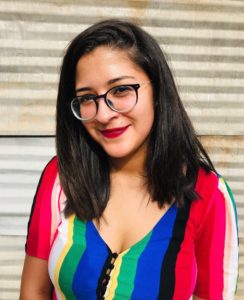 Growing up as a young Honduran-Panamanian immigrant in the United States, I predominantly found community within U.S. Latinx student groups. In these groups, I found a distinct sense of comfort and belonging that soothed the intense feelings of otherness I felt in this new country. As a matter of fact, some of the people I met in these groups remain my best friends and mentors until this day. However, through my lived experiences, political education, and involvement in organizing groups, I have become critical of Latinidad (succinctly, Latinx-ness) throughout the years. I have grown to focus on understanding and honoring the specificities of Latin Americans’ and U.S. Latinxs’ lived experiences and histories, as well as making visible the various levels of oppression and privilege obscured in this umbrella term,“Latinx.”
Growing up as a young Honduran-Panamanian immigrant in the United States, I predominantly found community within U.S. Latinx student groups. In these groups, I found a distinct sense of comfort and belonging that soothed the intense feelings of otherness I felt in this new country. As a matter of fact, some of the people I met in these groups remain my best friends and mentors until this day. However, through my lived experiences, political education, and involvement in organizing groups, I have become critical of Latinidad (succinctly, Latinx-ness) throughout the years. I have grown to focus on understanding and honoring the specificities of Latin Americans’ and U.S. Latinxs’ lived experiences and histories, as well as making visible the various levels of oppression and privilege obscured in this umbrella term,“Latinx.”
Navigating these complex feelings came hand-in-hand with my active involvement in less critical, multicultural student groups. In high school, it was comforting to build community with other young people of the Latin American diaspora. Most of the events we hosted as a student group involved celebrating our cultures and showcasing them to the broader student body: by cooking and selling tamales, throwing a school-wide reggaetón dance party every year, and building a collective altar for el Día de los Muertos. In hindsight, I can see how some of our programming operated on a reductive understanding of Latinidad as this nebulous umbrella term which often overlooked differences in race and class, nations of origin, and reasons for migrating, among others. However, these early experiences taught me lessons about community, celebration in the face of struggle, and most importantly, they set the stage for the development of my political consciousness.
Late in the fall of my first year in college, I joined the Latinx student union at my school. As a first-generation student from a working-class background, I finally felt like I had found a home within a predominantly white institution with a large economic disparity among the student body. However, as I sought to simultaneously find and make meaning of community, I began to recognize that divisive/exclusionary dynamics often showed up in these spaces as well. As we grew in community, healing, and political consciousness collectively, we complicated our understanding of what it means to be Latinx. We engaged in conversations around class, privilege, sexism, colorism, anti-blackness, queerness, homophobia, and transphobia within Latinx communities. This was a formative and generative experience.
These various communities have helped me make sense of the world, informed my politics, and pushed me to continuously question what Latinidad and liberation can mean and how I navigate my work and daily life. Nowadays, I am honored to be working on Migrant Roots Media, a platform that elevates the voices of migrants and seeks to unearth the root causes of global migration, such as U.S. interventionism in Latin America and other parts of the world. This has been a long and fruitful journey for which forging multi-racial, multi-generational and cross-class communities has been crucial. Audre Lorde put it best when she said, “There is no such thing as a single-issue struggle because we do not live single-issue lives.”
For informative and critical writings on Latinidad, check out these articles: The Problem with Latinidad by Miguel Salazar and The X in Latinx is a Wound, Not a Trend by Alan Pelaez Lopez.
Alejandra Mejía is the Chief Editor of Migrant Roots Media. Her politics and devotion to pro-migrant work are largely informed by being the daughter of a single, working-class immigrant mother.


There are no comments
Add yours